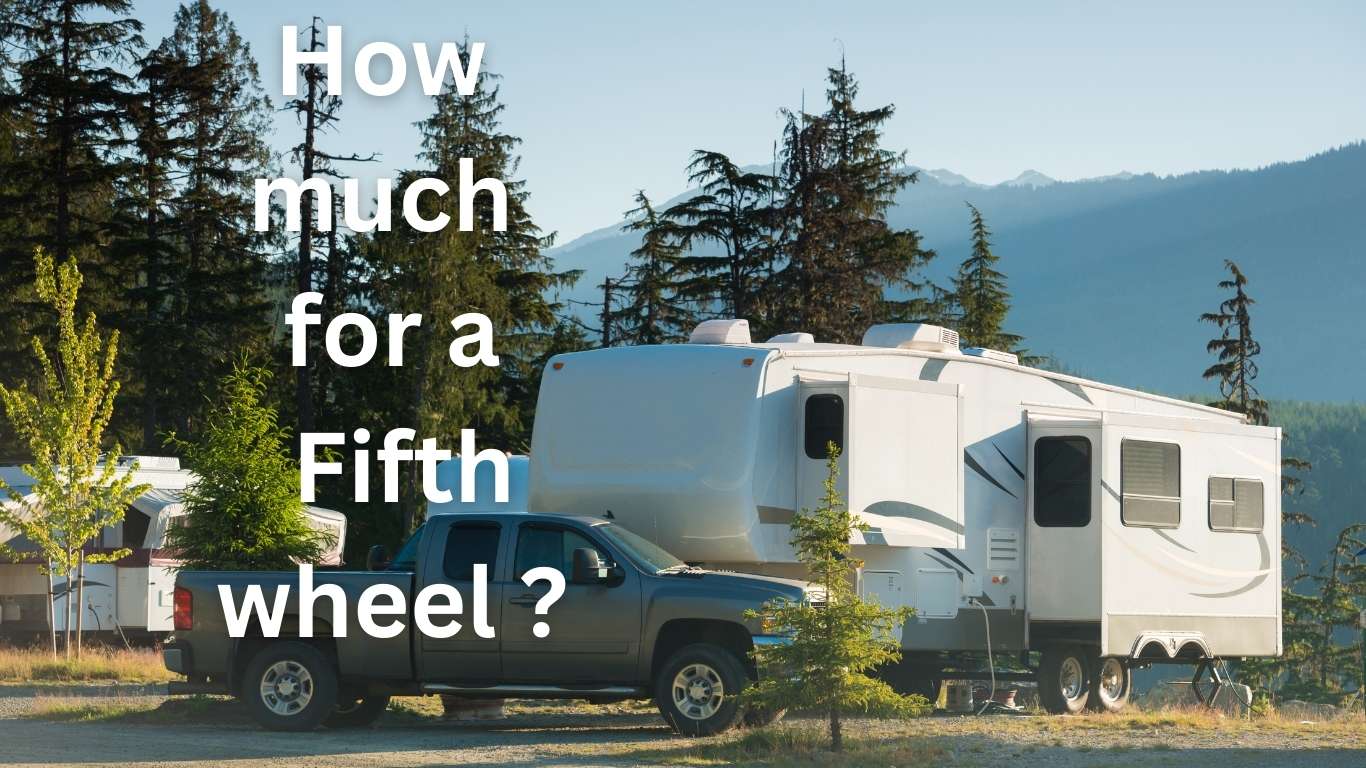When considering a fifth wheel camper trailer, a crucial component is the fifth wheel hitch. The cost varies depending on the type, quality, and towing capacity. Let’s break it down for you. By following means a person will easily know how much is for a fifth wheel hitch.
Average Cost of a Fifth Wheel Hitch
The cost for a fifth wheel hitch typically ranges as follows:
- Entry-Level Hitches: $300 – $600
- Mid-Range Hitches: $600 – $1,200
- Premium Hitches: $1,200 – $2,500+
Entry-level options are ideal for lighter trailers, while premium hitches provide better performance for heavy fifth wheel camper trailers.
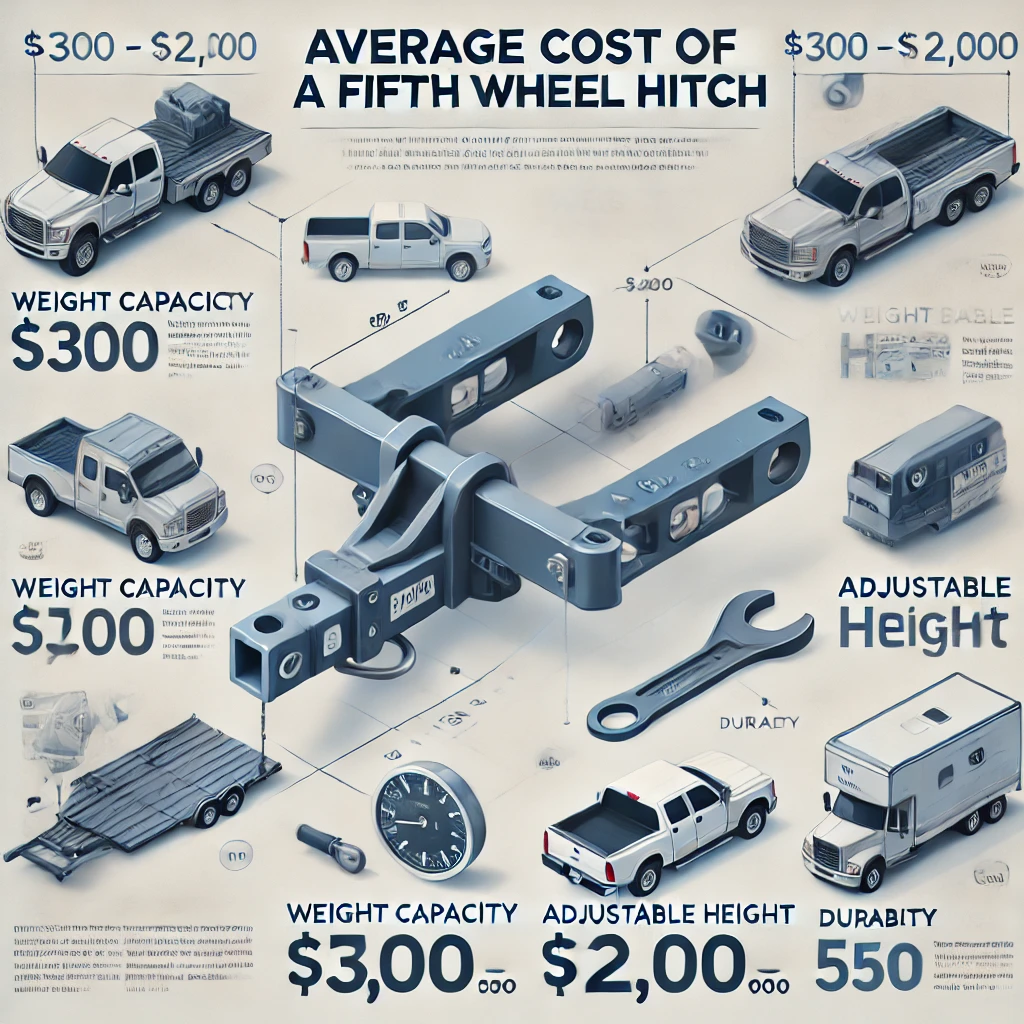
Installation Costs for a Fifth Wheel Hitch
Beyond the hitch price, installation costs should also be considered. On average:
- Professional Installation: $150 – $400
- DIY Installation: Free, but it requires time, tools, and experience.
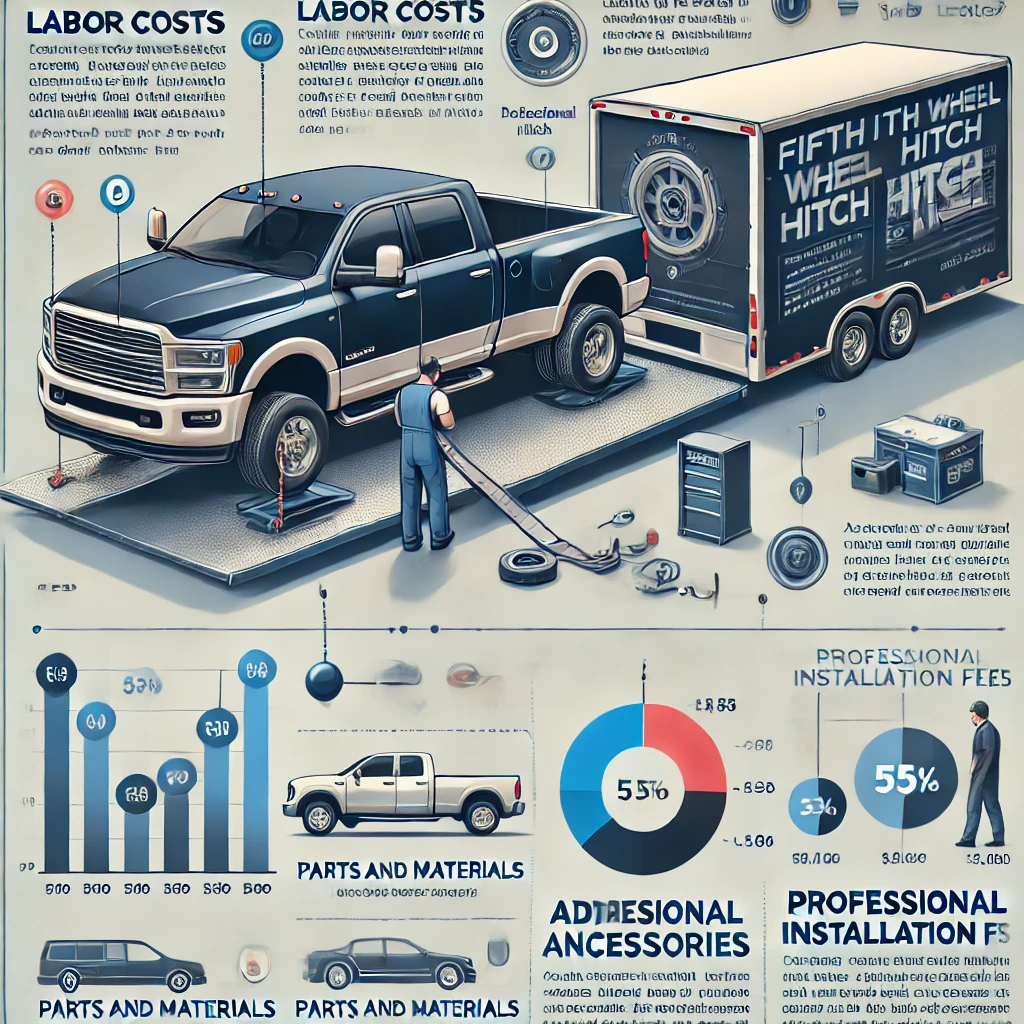
Investing in the Right Fifth Wheel Hitch
The cost of a fifth wheel hitch depends on your towing needs and budget. Whether you choose a basic model or a premium hitch, ensure it aligns with your fifth wheel camper trailer’s weight requirements for safe towing.
Factors Affecting the Cost of a Fifth Wheel Hitch
When deciding on the right fifth wheel hitch for your camper trailer, it’s important to consider several factors that directly impact the cost. Here are the key elements that influence how much you’ll spend:
1. Weight Capacity
The most significant factor affecting the cost of a fifth wheel hitch is its weight capacity. Hitches designed for heavier fifth wheel trailers generally cost more due to their reinforced construction. For example:
- Lightweight Hitches (up to 16,000 lbs): Lower cost, suitable for smaller trailers.
- Heavy-Duty Hitches (up to 25,000 lbs): More expensive, built for larger, heavier fifth wheel campers.
2. Hitch Features
The more advanced the features, the higher the price. Some fifth wheel hitches come with extra functionalities that enhance towing ease and safety, such as:
- Pivoting Heads: Allow for smoother turns and reduce strain on your trailer.
- Air-Ride Systems: Reduce bounce and provide a smoother towing experience.
- Sliding Hitches: Essential for short-bed trucks, these allow the hitch to slide back during sharp turns.
3. Brand and Build Quality
Top brands like B&W, Curt, and Reese are known for their quality and durability, often costing more than lesser-known brands. Paying for a trusted brand ensures long-term reliability and performance, especially for frequent travelers.
4. Installation Method
The installation process also affects cost. If you need professional installation, expect to pay more, while DIY installations can save you money but require time and tools. In addition:
- Custom Installations: Complex setups, like bed rails or custom brackets, can drive up costs.
5. Compatibility with Your Truck
Lastly, the hitch needs to be compatible with your truck bed size. Hitches for long-bed trucks tend to be less expensive, while short-bed trucks often require sliding hitches, which are pricier due to their added functionality.
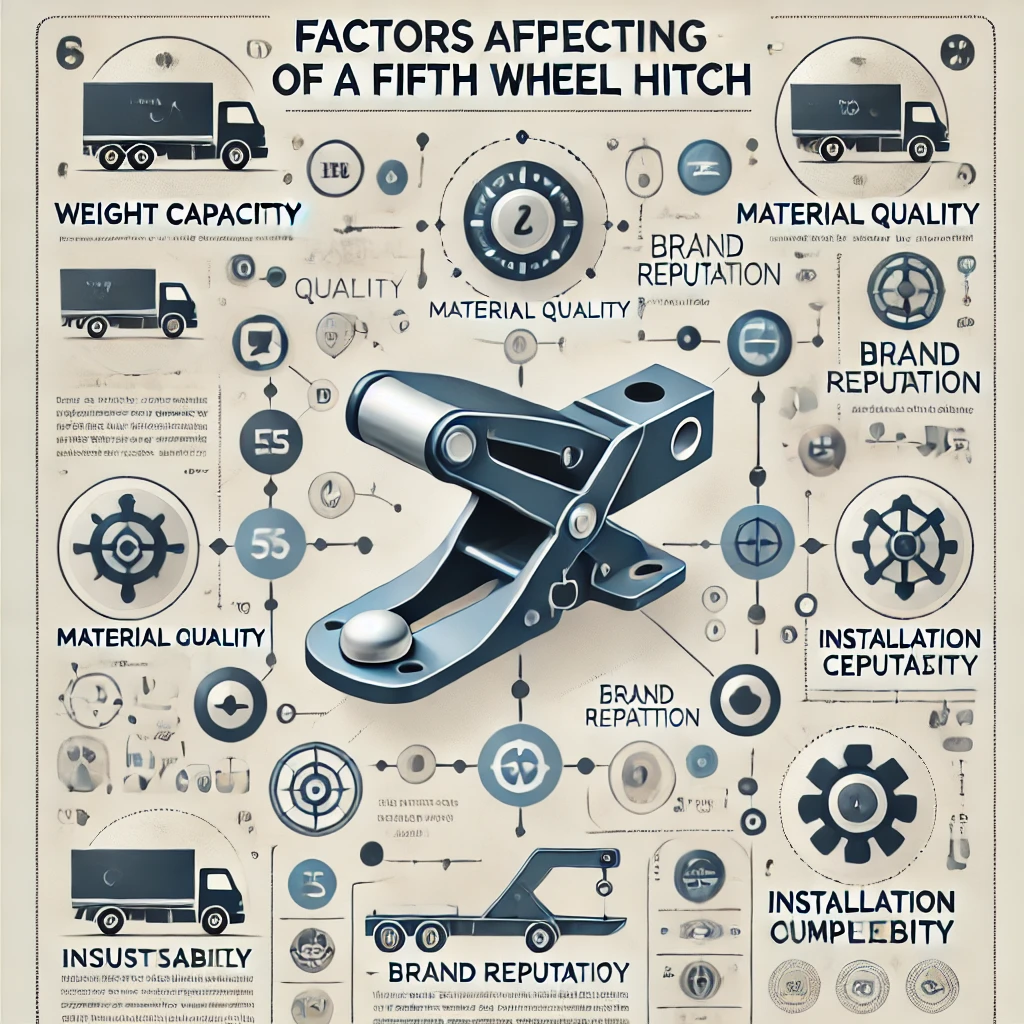
Different Types of Fifth Wheel Hitches and Their Prices
When choosing a fifth wheel hitch for your camper trailer, it’s important to know the different types and their price ranges. Each type is designed for specific needs, truck sizes, and towing capabilities. Let’s explore the options:
| Hitch Type | Price Range | Best For |
|---|
| Fixed Hitches | $300 – $1,200 | Long-bed trucks, basic towing. |
| Sliding Hitches | $800 – $2,000 | Short-bed trucks, tight turns. |
| Gooseneck Adapter Hitches | $400 – $1,000 | Gooseneck-equipped trucks. |
| Air-Ride Hitches | $1,500 – $2,500+ | Heavy trailers, smooth towing. |
| Single/Dual-Pivot Hitches | $300 – $1,500 | Basic and uneven terrain towing. |
1. Fixed Fifth Wheel Hitches
Fixed hitches are the most common and affordable option. They remain stationary and are ideal for long-bed trucks, where cab clearance during turns is not an issue.
- Price Range: $300 – $1,200
- Best For: Long-bed trucks towing lightweight to mid-weight trailers.
2. Sliding Fifth Wheel Hitches
Sliding hitches are designed for short-bed trucks. They allow the hitch to slide back during sharp turns, preventing the fifth wheel camper from hitting the truck cab.
- Price Range: $800 – $2,000
- Best For: Short-bed trucks that need extra turning clearance.
- Key Feature: Manual or automatic sliding mechanisms for added flexibility.
3. Gooseneck Adapter Hitches
Gooseneck adapter hitches convert a standard gooseneck connection into a fifth wheel hitch. They’re a versatile and cost-effective option for trucks with gooseneck setups.
- Price Range: $400 – $1,000
- Best For: Owners of trucks with gooseneck towing systems.
- Key Feature: Simple conversion without installing a new hitch.
4. Air-Ride Fifth Wheel Hitches
Air-ride hitches are premium options designed to absorb road shocks, reduce bounce, and provide a smoother towing experience. These are perfect for heavy trailers and long journeys.
- Price Range: $1,500 – $2,500+
- Best For: Large fifth wheel camper trailers and frequent travelers.
- Key Feature: Air suspension systems that improve stability and comfort.
5. Single-Pivot and Dual-Pivot Hitches
- Single-Pivot Hitches: Offer basic back-and-forth pivoting, ideal for flat terrain.
- Price Range: $300 – $800
- Dual-Pivot Hitches: Allow both side-to-side and back-and-forth movement for smoother towing on uneven roads.
- Price Range: $600 – $1,500
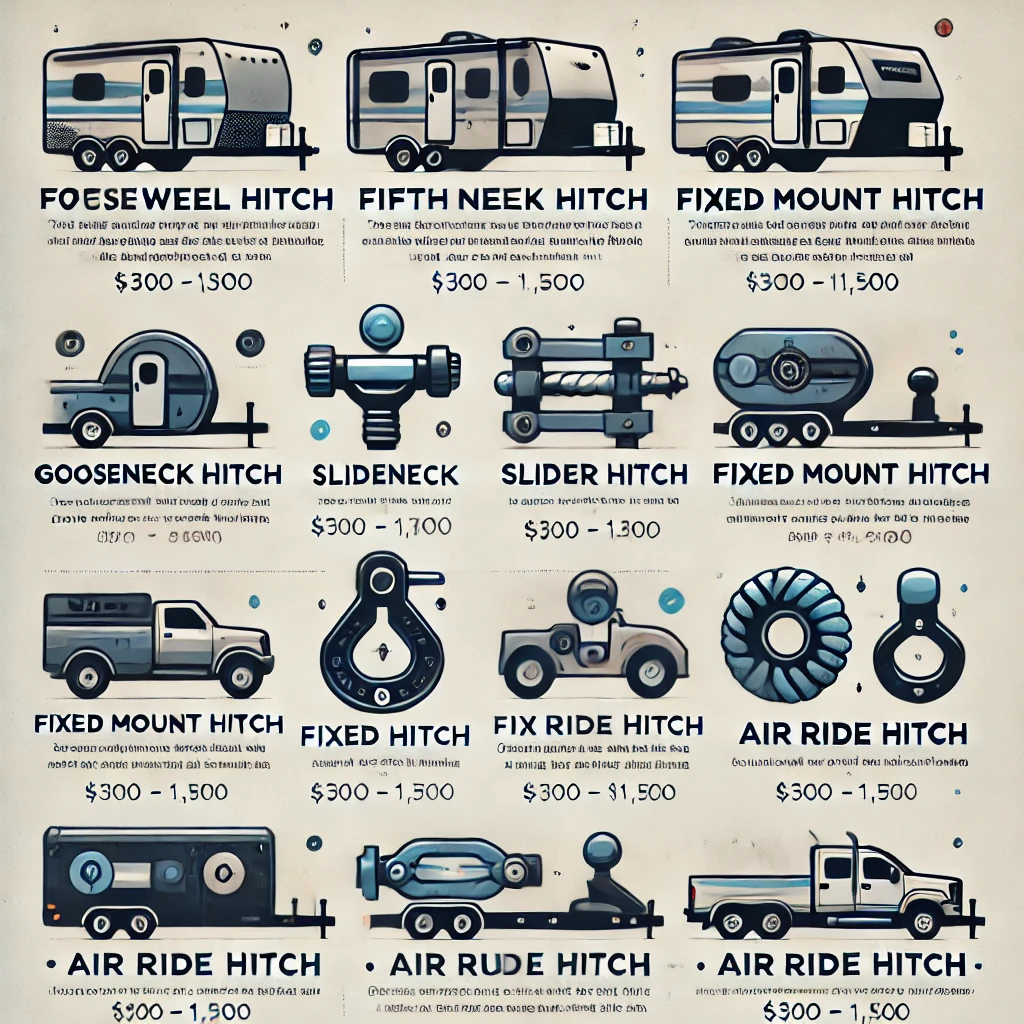
Important Things to Note Before Purchasing a Fifth Wheel Hitch
Choosing the right fifth wheel hitch is crucial for a safe and smooth towing experience. Before making a purchase, consider these important factors to ensure you get the best hitch for your fifth wheel camper trailer.
1. Weight Capacity of the Hitch
The first and most important factor is the hitch’s weight capacity. Check your trailer’s Gross Trailer Weight (GTW) and Pin Weight to ensure the hitch can handle the load.
- Light-Duty Hitches: Up to 16,000 lbs – Suitable for small to mid-size fifth wheel campers.
- Heavy-Duty Hitches: 20,000 – 25,000+ lbs – Required for larger, heavier trailers.
Tip: Always choose a hitch with a weight rating slightly above your trailer’s total weight for safety.
2. Truck Bed Size
The size of your truck bed determines whether you need a fixed hitch or a sliding hitch:
- Long-Bed Trucks: A fixed hitch works perfectly since there’s enough clearance for turns.
- Short-Bed Trucks: A sliding hitch is essential to prevent the trailer from hitting the truck cab during sharp turns.
3. Type of Hitch
Understanding the different types of hitches will help you choose the one that best suits your towing needs:
- Fixed Hitch: Ideal for long-bed trucks and budget-conscious buyers.
- Sliding Hitch: Essential for short-bed trucks.
- Gooseneck Adapter Hitch: Works for trucks with gooseneck towing setups.
- Air-Ride Hitch: Perfect for heavy trailers and smooth rides on rough roads.
4. Ease of Installation
Consider whether you want to install the hitch yourself or hire a professional. Some hitches come with bolt-on installations that are DIY-friendly, while others require custom mounts, increasing installation costs.
- DIY Installation: Saves money but requires tools and time.
- Professional Installation: Adds $150 – $400 but ensures a secure setup.
5. Hitch Features
Look for additional features that enhance safety and convenience:
- Pivoting Heads: Allow for smooth towing over uneven roads.
- Jaw Type: Full-wrap jaws provide a tighter, more secure grip.
- Height Adjustability: Helps align the hitch with your fifth wheel camper for level towing.
6. Budget and Quality
Balancing your budget with quality is key. While cheaper hitches save money upfront, investing in a reputable brand ensures durability and long-term reliability. Trusted brands like B&W, Curt, Reese, and Andersen are popular choices.
7. Compatibility with Your Truck
Verify that the hitch you choose is compatible with your truck’s make, model, and towing setup. Some trucks require specific rail kits or adapters for mounting the hitch securely.
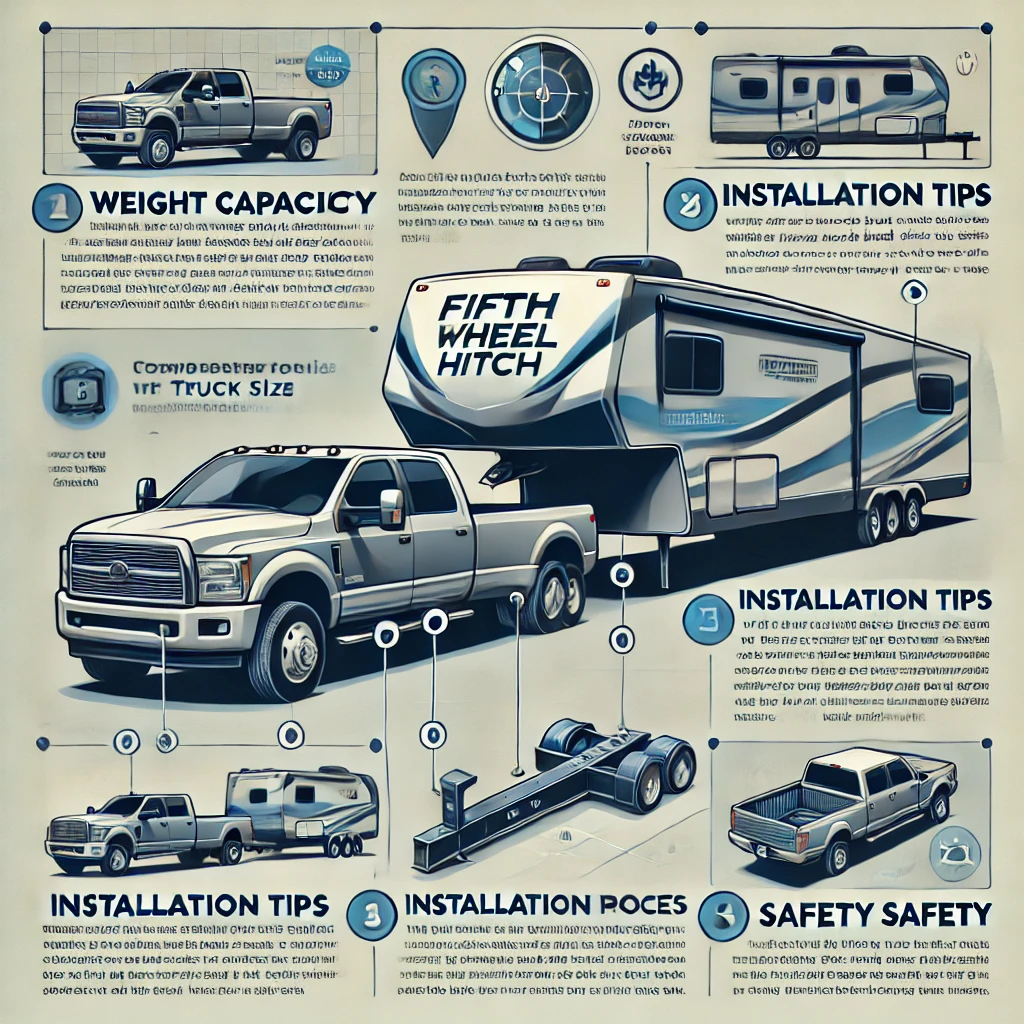
Common Mistakes When Purchasing a Fifth Wheel Hitch and Their Solutions
Selecting the right fifth wheel hitch is essential for safe towing, but buyers often make mistakes that can lead to problems on the road. Here are the most common mistakes and practical solutions to avoid them.
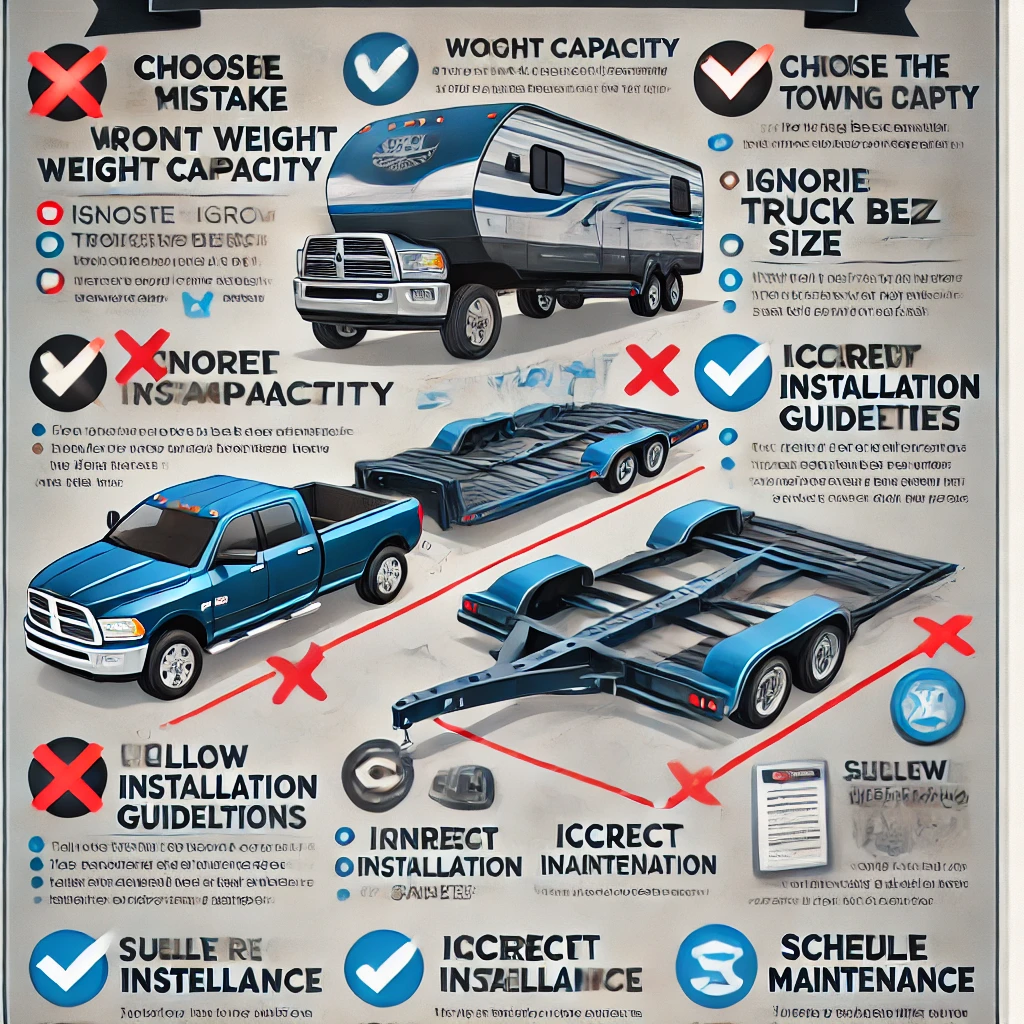
1. Choosing the Wrong Weight Capacity
Mistake: Buying a hitch with a lower weight rating than your trailer’s Gross Trailer Weight (GTW) and pin weight. This can result in hitch failure and unsafe towing.
Solution:
- Always verify your fifth wheel camper’s GTW and pin weight before purchasing.
- Choose a hitch with a weight rating slightly higher than your trailer’s total weight for added safety.
2. Ignoring Truck Bed Size
Mistake: Using a fixed hitch with a short-bed truck. This limits turning clearance and can cause the fifth wheel camper to hit the truck cab during sharp turns.
Solution:
- For short-bed trucks, purchase a sliding hitch. It allows the hitch to slide backward, creating extra space during tight turns.
- For long-bed trucks, a fixed hitch is sufficient.
3. Incorrect Hitch Installation
Mistake: Poor or improper hitch installation can result in instability, uneven weight distribution, or even accidents.
Solution:
- Hire a professional installer for proper setup, especially for complex installations.
- If you opt for a DIY installation, follow the manufacturer’s instructions carefully and ensure all bolts and mounts are secure.
4. Overlooking Hitch Compatibility
Mistake: Purchasing a hitch that is incompatible with your truck’s mounting system or towing setup.
Solution:
- Confirm that the hitch you choose matches your truck’s rail system (OEM or aftermarket).
- If your truck has a gooseneck setup, consider a gooseneck adapter hitch for easy conversion.
5. Not Considering Additional Features
Mistake: Focusing only on price and ignoring features that improve safety and towing performance, like pivoting heads or jaw types.
Solution: Look for helpful features such as:
- Pivoting Heads: Allow smooth movement on uneven terrain.
- Full-Wrap Jaws: Provide a tighter, more secure connection.
- Height Adjustability: Ensures the fifth wheel camper sits level with your truck.
6. Forgetting About Maintenance
Mistake: Buying a hitch and neglecting its maintenance, which leads to wear, rust, and reduced performance.
Solution:
- Regularly lubricate moving parts like the jaw and kingpin plate.
- Check for loose bolts or signs of rust before every trip.
- Use a hitch cover to protect it from harsh weather conditions.
7. Buying Based on Price Alone
Mistake: Opting for the cheapest hitch without considering durability and brand reputation. Low-quality hitches can fail over time.
Solution:
- Invest in a trusted brand like B&W, Curt, Reese, or Andersen for long-term performance.
- Balance affordability with quality to ensure safety and durability.
Avoid These Mistakes for a Safe Ride
By avoiding these common mistakes—like ignoring weight limits, bed size, or installation—you can ensure a smooth and safe towing experience with your fifth wheel camper trailer. Take time to evaluate your needs, invest in quality, and prioritize safety for worry-free adventures on the road.
More related details will be available on Flamingo Motorhomes.

